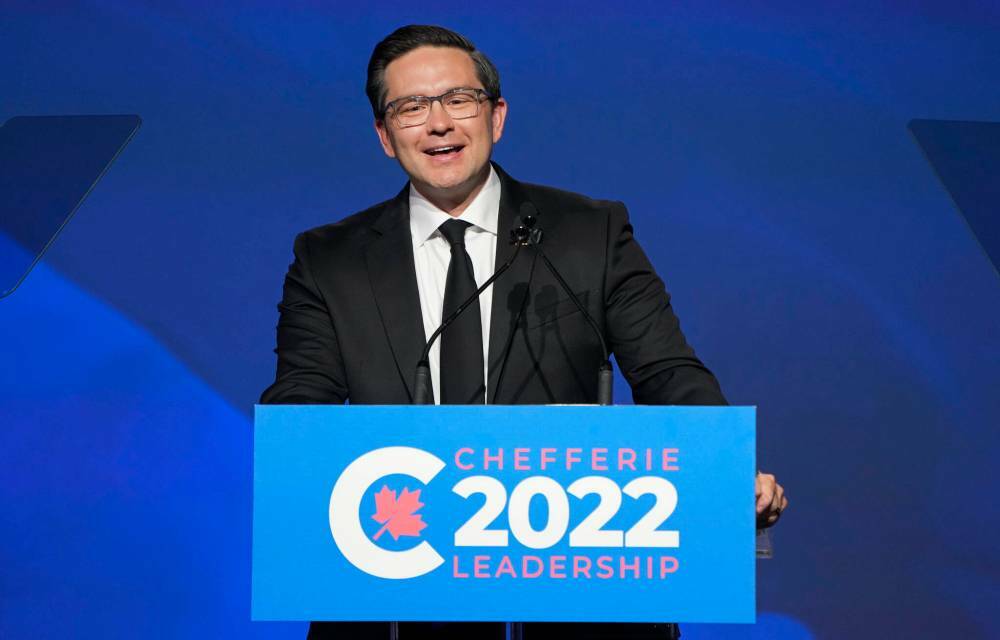Poilievre will leave imprint on CPC
Advertisement
Read this article for free:
or
Already have an account? Log in here »
To continue reading, please subscribe:
Monthly Digital Subscription
$19 $0 for the first 4 weeks*
- Enjoy unlimited reading on winnipegfreepress.com
- Read the E-Edition, our digital replica newspaper
- Access News Break, our award-winning app
- Play interactive puzzles
*No charge for four weeks then billed as $19 plus GST every four weeks. Offer only available to new and qualified returning subscribers. Cancel any time.
Read unlimited articles for free today:
or
Already have an account? Log in here »
Hey there, time traveller!
This article was published 15/09/2022 (831 days ago), so information in it may no longer be current.
PIERRE Poilievre is the new leader of the Conservative Party of Canada and leader of His Majesty’s Official Opposition.
The CPC leadership race should have been a competitive and exciting affair, with Poilievre originally facing Jean Charest, a former Quebec premier and very experienced politician, and Patrick Brown, a former leader of the Ontario PC party well known for effective organizing in exactly these types of competitions.
Instead, Poilievre, a mere member of Parliament for an Ottawa-area seat, crushed the competition, receiving 70.7 per cent of the ballots cast. When broken down by riding, Poilievre clinched the most votes in 330 out of 338 seats. His decisive win is similar to former leader Stephen Harper’s margin in the 2004 Conservative leadership race against Belinda Stronach and Tony Clement, where Harper scored 68.9 percent of the ballots cast.

WINNIPEG FREE PRESS FILES
Newly elected Conservative Leader Pierre Poilievre is very much in tune with different currents of thought and activism within the CPC.
While Brown was ejected from the race over allegations of cheating, Charest’s result, only 11.6 per cent of the votes cast, is strikingly disappointing. Charest is a very experienced politician who had significant institutional support in the party. But the result is perhaps not surprising, given some weaknesses Charest brought to the race: notably, his previous work in the private sector supporting the Chinese communication giant Huawei and several corruption scandals linked to his Quebec provincial government.
In general, former provincial premiers, despite often having a wealth of executive experience, have not actually fared well in federal politics, which is perhaps regrettable.
But, ultimately, this is no longer Charest’s Conservative Party. During his campaign, Charest talked up his admirable role on the “no” side of the 1995 sovereignty referendum, in which he contributed to Quebec ultimately staying in Canada. There is no doubting Charest’s contribution to a united Canada. But, for many in the party, 1995 seems like ancient history.
Indeed, many young Conservative voters have no memory of this period in Canadian history, and will only learn about it in courses like the ones I teach at the University of Manitoba.
In contrast, Poilievre is very much in tune with different currents of thought and activism within the CPC.
During the leadership race, political theorist Ben Woodfinden argued against critics of Poilievre who felt he was too radical for the leadership by instead insightfully labelling Poilievre a “company man” and, in many ways, the natural successor to Harper’s previous leadership.
Poilievre, Woodfinden pointed out, has been an MP since 2004; indeed, he has been a fixture in the party essentially from its creation. Poilievre served in a variety of roles in Harper’s government, from the prime minister’s parliamentary secretary to minister of employment and social development.
When the party fell from power in 2015, he became a prominent and effective critic of Justin Trudeau’s governments.
Poilevre’s own evolution as a political figure has taken place within the institution of the Conservative Party, and there are clear parallels between his own political ideas and those of Harper.
Does this mean Poilievre will be a carbon copy of Harper as leader? I don’t think so. His leadership campaign showed an ability for Poilievre to innovate on Harper’s formula. In particular, some Conservatives worried that he was too populist, and too willing to blame “elites” for the problems Canadians face and to offer simplistic, unworkable solutions.
These arguments ignore that populism has, for decades, been an important cornerstone of conservatism in Canada, certainly since Preston Manning and the Reform Party stormed Canadian politics in the 1993 federal election. In embracing populist approaches to politics, Poilievre simply capitalized on a strong current of populist thought in the party.
And this approach could pay dividends. Indeed, some commentators noted that much of Poilievre’s victory speech, with his frequent references to elites and the welfare of working-class Canadians, sounded like it could have been delivered by the leader of the NDP.
The concern from NDP politicians is that Poilievre has positioned himself to steal working-class support from New Democrats in the same way Ontario Premier Doug Ford has.
Poilievre also showed an ability in the leadership race to attract support from former Conservative supporters who had left the party to support Maxime Bernier’s People’s Party of Canada. In this respect, he resembled his ally and former leader, Andrew Scheer, who effectively blunted Bernier in the 2019 election.
But in the coming general election campaign, Poilievre will have to balance the need to fend off Bernier’s challenge from the right with the need to also steal votes from the Liberals.
All this is to say that Poilievre has several different opportunities to reshape conservatism in Canada from the formula he has inherited from Harper. His impressive victory in the leadership race and strong support within the party, especially within the caucus, give him wide freedom to leave his own imprint on the Conservative Party.
Royce Koop is a professor of political studies at the University of Manitoba and academic director of the Centre for Social Science Research and Policy.

